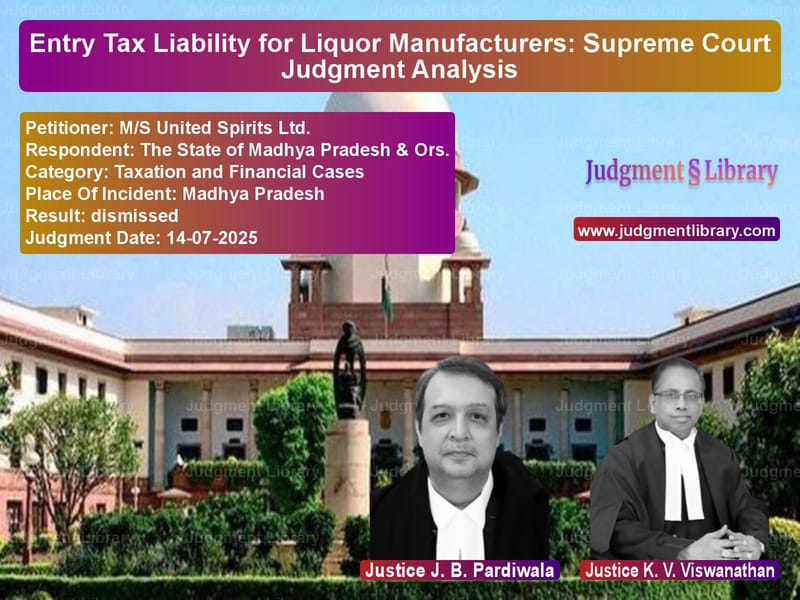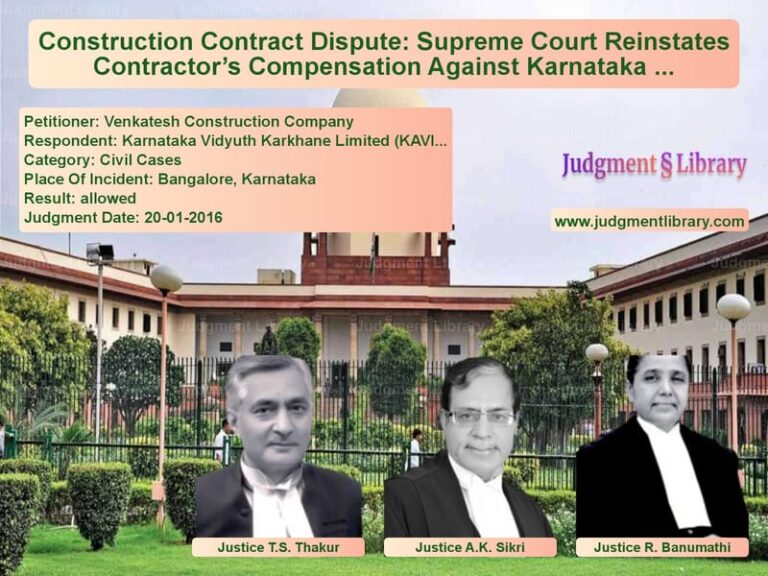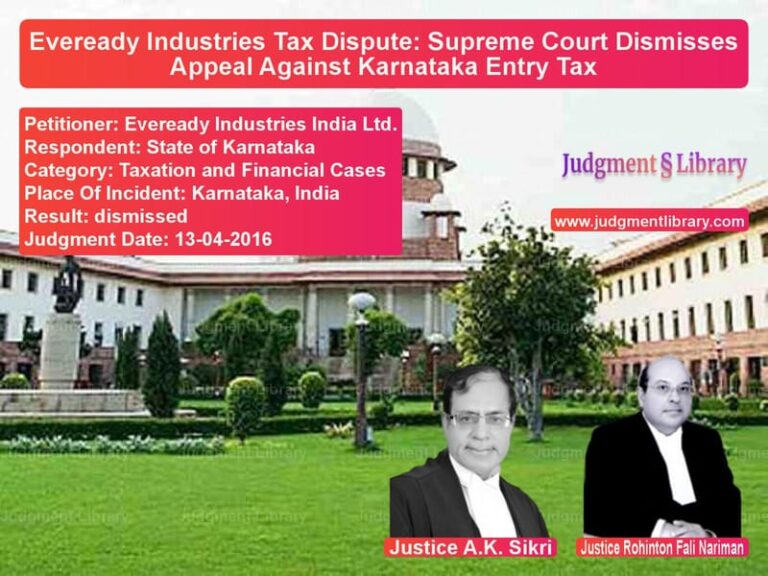Entry Tax Liability for Liquor Manufacturers: Supreme Court Judgment Analysis
The Supreme Court of India recently delivered a significant judgment clarifying the liability of liquor manufacturers for payment of entry tax under the Madhya Pradesh Entry Tax Act. The case involved M/s United Spirits Ltd., a prominent liquor manufacturer, challenging the State of Madhya Pradesh’s demand for entry tax on Indian Made Foreign Liquor (IMFL) and beer supplied through government warehouses.
The dispute centered around whether the manufacturers or the state government warehouses should bear the liability for entry tax on liquor products entering local areas for consumption. The appellants, United Spirits Ltd., argued that they merely supplied goods to government warehouses, which then sold them to retailers, creating two separate transactions. The state government, however, contended that the manufacturers were the ones who actually caused the entry of goods into local areas and should therefore be liable for the tax.
The case presented an interesting legal question about the interpretation of tax liability in complex supply chain arrangements involving government intermediaries. The Supreme Court’s decision has significant implications for the liquor industry and tax administration in states that follow similar distribution models.
Background of the Case
The appellants, United Spirits Ltd., are engaged in bottling and supplying beer and Indian Made Foreign Liquor under licenses granted under the M.P. Excise Act, 1944. They operated under a system where they supplied goods to State Government warehouses after obtaining No Objection Certificates from excise officials. The transportation passes were issued in the name of the concerned warehouses, and sales were ultimately made by warehouse in-charges to authorized retailers.
The appellants maintained that they held FL-9 and FL-9A licenses for manufacturing IMFL products, which permitted them to sell only to FL-10 licensees. In Madhya Pradesh, the FL-10 licensee is the Excise Department, which operates State Government warehouses. Retailers holding FL-1 licenses purchase from these warehouses after obtaining NOCs from District Excise Officers.
The appellants argued that the actual transaction occurred between government warehouses and retailers, with warehouses depositing amounts payable to manufacturers in their bank accounts after deducting various charges. They contended that retailers paid license fees in equal installments and were paying 6% ‘Parivahan Shulk’ (transportation expenses) to the treasury.
The State Government’s Position
The respondent-state presented a different perspective, arguing that the State Government neither purchases nor sells liquor. They relied on three crucial documents: communications from the Additional Secretary (Finance Department) regarding collection of IMFL and its supply to retail licensees, and Guidelines for Officers-in-charge of Foreign Liquor warehouses issued on March 27, 2002.
These documents revealed that manufacturing units were allowed to store liquor in departmental godowns after declaring ex-godown prices. Supply to retail contractors was effected by adding 5% additional fee to this cost. Retail contractors deposited amounts with specified banks, which then transferred funds to government accounts. Deputy Commissioners received statements of deposited amounts twice monthly, and payments due to manufacturing units were made by the Excise Commissioner.
The state emphasized that under the guidelines, retail sale licensees submitted demand notes for liquor supply, warehouse officers scrutinized these demands, computer rooms prepared delivery challans, and manufacturers informed retailers about amounts to be deposited. The entire process was tightly controlled, with bank counters established within warehouses themselves for payment collection.
Legal Framework
The legal battle centered on Section 3 of the Madhya Pradesh Entry Tax Act, 1976, which levies entry tax on goods specified in Schedule-II entering local areas for consumption, use, or sale. Until March 31, 2007, no entry tax was levied on beer and IMFL in Madhya Pradesh. The amendment Act of 2007 added “Indian made foreign liquor and beer” to Schedule-II with a tax rate of 2%.
The Amendment Act also introduced Section 3B, which stated: “Notwithstanding anything contained in this Act, the State Government may, by notification, specify the manner and appoint the competent authority, to collect entry tax in respect of India made foreign liquor and beer on such terms and conditions as may be specified therein.”
Crucially, Section 2(3) of the Entry Tax Act provided that any reference to “has effected entry of goods” shall be construed as including a reference to “has caused to be effected entry of goods.”
Arguments Presented
The appellants’ counsel, Mr. Rohan Shah and Mr. Sumit Nema, argued that depending on retailers’ requirements, State Government warehouses issued indents to manufacturers for supply to warehouses. Only after receiving NOCs from warehouses could State Excise Officers allow removal of exact quantities by issuing Transit Passes under Rule 14(1) of M.P. Foreign Liquor Rules, 1996.
They contended that manufacturers issued invoices in the name of State Government warehouses, and no privity existed between retailers and manufacturers. From prices paid by retailers, State Excise Duty, VAT, and transportation fees/commission were deducted before transferring amounts to manufacturers. The appellants argued that Government warehouses not only sold but undoubtedly distributed goods, making them “dealers” as per Explanation II to Section 2(i) of M.P. VAT Act, 2002.
The appellants maintained that manufacturers couldn’t be taxed since they didn’t effect or cause to effect entry of goods – only State Government warehouses did. They also argued that without notification under Section 3B, no levy could be effected, and pointed to a communication from Commissioner, Commercial Tax to Excise Commissioner directing that entry tax ought to be paid by warehouse of excise department.
Mr. Nachiketa Joshi, learned Additional Advocate General for the state, supported the High Court’s judgment upholding levy on manufacturers. He argued that warehouses neither purchase nor sell liquor, and the Department only supervises sales made by manufacturers to retail contractors. He contended that Section 3B was merely an enabling machinery provision, and even without notification under it, Section 14 enabled levy of entry tax on manufacturers.
The state’s counsel also drew attention to a subsequent communication from Commissioner, Commercial Tax correcting the earlier communication and clarifying that only manufacturing units were liable to pay entry tax. He relied on Bhagatram Rajeevkumar vs. Commissioner of Sales Tax, M.P. to sustain the levy on manufacturers.
Court’s Analysis and Reasoning
The Supreme Court framed the central question: “Did the appellants cause to effect the entry of goods into the local area as required under Section 3(1)(a) read with Section 2(1)(aa), 2(1)(b) and 2(3) of the M.P. Entry Tax Act, 1976, rendering them liable for entry tax for the period 01.04.2007 to 31.03.2008?”
The Court examined whether the transaction constituted an inseverable link between manufacturers and retailers or represented two independent transactions. Referring to precedents on canalizing agents and intermediary transactions, the Court summarized principles from K. Gopinathan Nair & Ors. v. State of Kerala, noting that unless a canalizing agency acts merely as a “name lender,” sales won’t be treated as inseparable.
The Court observed: “if an independent canalizing agency enters into back-to-back contracts and there is no direct linkage or causal connection between the export by foreign exporter and the receipt of the imported goods in India by local users, then the integrity of the entire transaction would be disrupted and would be substituted by two independent transactions.”
Applying these tests, the Court found: “we have no manner of doubt that there were two independent transactions, one between the appellant – manufacturers and the State Warehouse and the other between the State warehouse and the retailers. Hence, it will be difficult to accept the contention of the State that the role of the State is only supervisory and the warehouses didn’t purchase beer and IMFL from the manufacturer.”
However, this finding didn’t resolve the issue in appellants’ favor. The Court turned to whether manufacturers “caused to be effected the entry of goods.” Examining the definition of “cause” as “person or thing that occasions or produces something,” the Court referred to Azad Coach Builders case which interpreted “occasioning the export” to mean “the factors, which were the immediate cause of export.”
The Court held: “the appellants by the sale to the warehouse caused to be effected the entry of goods and the entry was occasioned on the account of the sale into the local area for consumption, use or sale therein.” The Court noted that appellants were undoubtedly dealers under M.P. VAT Act, and the fact that State warehouses might also be dealers didn’t affect manufacturers’ liability.
Regarding Section 3B, the Court agreed with the High Court that it was “only a machinery provision” and “in the teeth of Section 14 of the M.P. Entry Tax Act, it is not correct to say that there cannot be any assessment or collection of Entry Tax merely because there is no notification under Section 3B.”
The Court elaborated: “Section 3B of the M.P. Entry Tax is an enabling provision. Further, the ‘non-obstante’ in Section 3B will not foreclose the operation of Section 14, since Section 3B will override only if there is a contrary provision. In the absence of any notification under Section 3B, there is nothing contrary in Section 14 for the non-obstante in Section 3B to be invoked to override Section 14.”
Conclusion
The Supreme Court ultimately dismissed the appeals, upholding the levy of entry tax on manufacturers. The Court found that manufacturers indeed caused the entry of goods into local areas through their sales to warehouses, making them liable for entry tax under the statutory scheme. The judgment reinforces that tax liability follows the economic activity of causing goods to enter taxable territories, regardless of complex distribution arrangements involving government intermediaries.
This decision has significant implications for manufacturers operating through state-controlled distribution systems, clarifying that they cannot avoid tax liability by arguing that subsequent transactions in the supply chain should bear the tax burden. The Court’s interpretation of “causing entry” of goods provides important guidance for similar tax disputes across various sectors with regulated distribution models.
Petitioner Name: M/S United Spirits Ltd..Respondent Name: The State of Madhya Pradesh & Ors..Judgment By: Justice J. B. Pardiwala, Justice K. V. Viswanathan.Place Of Incident: Madhya Pradesh.Judgment Date: 14-07-2025.Result: dismissed.
Don’t miss out on the full details! Download the complete judgment in PDF format below and gain valuable insights instantly!
Download Judgment: ms-united-spirits-l-vs-the-state-of-madhya-supreme-court-of-india-judgment-dated-14-07-2025.pdf
Directly Download Judgment: Directly download this Judgment
See all petitions in Income Tax Disputes
See all petitions in GST Law
See all petitions in Tax Evasion Cases
See all petitions in Banking Regulations
See all petitions in Tax Refund Disputes
See all petitions in Customs and Excise
See all petitions in Judgment by J.B. Pardiwala
See all petitions in Judgment by K.V. Viswanathan
See all petitions in dismissed
See all petitions in supreme court of India judgments July 2025
See all petitions in 2025 judgments
See all posts in Taxation and Financial Cases Category
See all allowed petitions in Taxation and Financial Cases Category
See all Dismissed petitions in Taxation and Financial Cases Category
See all partially allowed petitions in Taxation and Financial Cases Category







